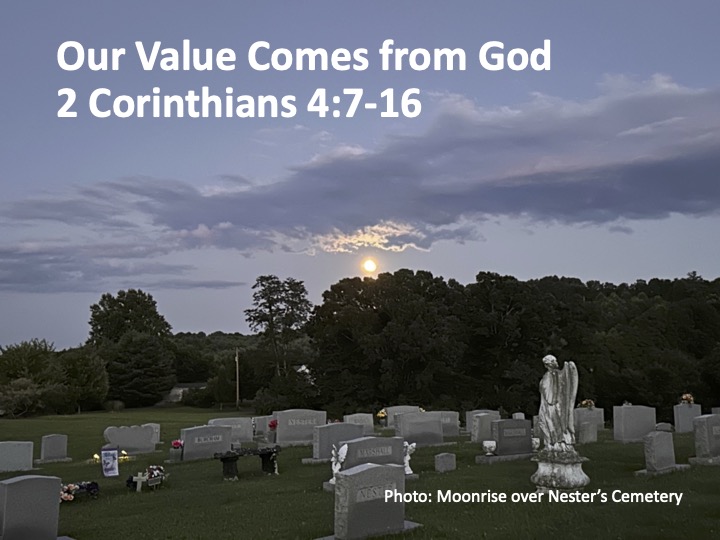Jeff Garrison
Mayberry and Bluemont Presbyterian Churches
2 Corinthians 4:5-16
August 6, 2023
At the beginning of worship
Are we valuable? Somewhere I remember hearing that each of us contain about two and a half bucks of valuable minerals. It might be a bit more if you have silver or gold fillings or a titanium joint. Two and a half bucks isn’t bad. After all, the Bible tells says we’re dust.[1]
The body’s real value
Doesn’t sound like our bodies are very valuable, does it? If you think about the body in an economic way, you might decide it’s best to escape the body so that the soul might ascend to heaven.[2] Yet, the Creed reminds us of the resurrection of the body. So, the body is importance, not only in this life but in the life to come.
The Bible also says that God created us as a body, from the dust of the ground and blew life into our nostrils.[3] The Divine getting down on his knees and taking the time to shape us into a body made in his image provides us value.[4] Think of yourself as artwork, created by the Master Artist. Furthermore, it is in these bodies God came among us in Jesus Christ. In the body, we also experience God. Thanks to the work of Jesus Christ and the Holy Spirit, we are transformed into a valuable member of God’s family. When you are down and out, don’t think you’re not valuable. For all who trust and believe in Jesus are a member of the King’s family.
Before reading the Scripture
Today, we’re continuing our work through Second Corinthians. It’s an overwhelming task, but we’ll finish before Advent. Of the letters we have in the New Testament, Paul wrote more to the Corinthians than to any other church. He also spent a year and a half in Corinth, ministering to the people there.
Paul’s problem
Paul has been held in high esteem over the centuries. He’s responsible for much of the New Testament. But if you read his letters, you get the sense that not everyone appreciated him during his lifetime. We joke about Paul putting people asleep during his sermons, but then I’m sure most of you would be asleep if I tried to preach through the night and into the early morning hours.[5] There were others who questioned Paul’s authority. While he was called by Jesus on the Damascus Road,[6]Paul did not meet Jesus personally during our Savior’s ministry on earth. But he did meet him later. Of course, there were also tension between Jewish believers and Paul,[7] who was called to the Gentiles, as well as tensions between Paul and other missionaries.[8]
We’ve seen evidence of the unknown conflicts which Paul faced over the past few sermons. These conflicts must have been painful to Paul and to some within the church.[9] But Paul’s main concern, as we saw in last week’s passage, is the glory of God. For Paul, we don’t take slights and attacks personally, for in doing so could diminish God’s glory. Everything is to be done with God in mind. This is why Paul makes such a strong case for depending on God’s strength. As humans, we’re limited. We are frail. We fail.
None of us are perfect, including Paul
Like Paul realized in his own situation, there are times you say the wrong things. I’m sure I have said and done the wrong things to some of you… If so, I’m sorry. I say that not as an excuse, but as a realization it’s a part of who we are as creatures. We’re not perfect, which is why we are not to be boastful about what we’ve done, only about what God has done and is doing through us. Humility must be in the forefront of a Christian’s life.
Now Paul continues, talking about his and our role in helping others experience the gospel.
Read 2 Corinthians 4:7-15
Clay jars are for storage
In the seventh verse, Paul speaks of treasure in clay jars. In Paul’s day, clay jars or pots along with baskets were the main thing people had to store stuff in. Today, we have cardboard boxes—I’m not sure how many cardboard boxes are in my basement nearly three years after moving. Like the clay vessels of Paul’s day, cardboard boxes are not valuable. They’re cheap and expendable (but let’s recycle them). Cardboard boxes protect that which is inside, which may be valuable: keepsakes, books, and the china.
A metaphor for the flesh
Paul uses clay jars (and we could use cardboard boxes) as a metaphor for the flesh. Boxes and pots, like our bodies, can be easily broken and destroyed. And by themselves, they’re not valuable—two and a half bucks or a little more… This doesn’t mean our bodies are not important or that Paul wants to escape his body and be united with Christ.[10]
God created our bodies in his own image. Second, it is in the body that we can experience God’s grace and glory. Just as it was in the flesh that Jesus came to us. As frail as we may be, and as flawed as we may be, God sees something of value within us and works through us. The treasure that Paul speaks of is the light of the knowledge of the glory of God that we’ve encountered through Jesus Christ.[11] This isn’t something that comes with the body, but through the indwelling of God’s Spirit.
Value and ability from the Creator
Anything worthwhile we do, isn’t because of our own power and strength, knowledge, and wisdom. It’s because our Creator bestows us with such abilities. Paul’s point is that anyone looking at him would not think he was capable of being the world’s greatest missionary, and they’re right. He was not capable, but with God working through him Paul was able to do incredible things.[12]
Challenges overcome
After speaking of clay jars, Paul moves into a powerful set of contradictions in verses 8 and 9:
- afflicted, but not crushed,
- perplexed but not driven to despair,
- persecuted but not forsaken,
- struck down, but not destroyed.
Paul leaves no doubt that any success he’s enjoyed did not come from him, but from God! Paul may have said this because other teachers have come along and claimed to be superior or to have better gifts than Paul. But Paul isn’t having any of that. He can do what he can do, because of God working through him.[13]
The Christian life isn’t easy
Furthermore, from this list of comparison, Paul wants us to know that the Christian life isn’t a cakewalk. Pressures do not get Paul down because God’s power enables him to endure.[14] It’s a hard life, but because of God working through us, it’s a worthwhile life.
Long section in the letter where Paul defends himself
This long section of the letter, which began back in chapter 2 with Paul saying he forgave whoever it was that had abused him, now comes back to the idea of God and God’s mission of which Paul, like us, is just a vessel. My purpose here, as it has been at every congregation I’ve served as a pastor, is not to proclaim my greatness. As a pastor, I’m humble myself before you and God and point to God as revealed in Jesus Christ as our only hope in life and death.[15] And you’re to do the same in your life. We are to strive to glorify Christ.
But Paul speaks for everyone
In verse 16, Paul moves from his defense of himself, to include everyone when he says, “So we do not lose heart.” Paul’s not just writing about himself here, he’s writing about us all. And he reminds us that our hope isn’t in this life, which is temporary, but in the life to come, a life with God who is redeeming heaven and earth. Paul would never say that our work here is not important. It is because we are working with God to redeem a fallen world. And it’s not our abilities that makes our work important, but our Creator, the one who has redeemed us and who works through us to spread this message.
Conclusion
Keep your eyes focused on Jesus. Be a light and a beacon for him. May your actions be worthy of him, and your words be uplifting and loving. Yes, we live in a mixed-up world with lots of trouble, but that’s no excuse for bad behavior, for while we live in this world, we live for the world to come. Love everyone, extend grace to all, be quick to forgive, and humble yourselves before the God who has created you, who redeems you, and who sustains you. Amen.
[1] Genesis 3:19.
[2] This is the gnostic heresy, and also an idea from Platonic thought, where the ideal is beyond the body (and this life).
[3] Genesis 2:7.
[4] Created in God’s image comes from the first creation account. Genesis 1:27.
[5] Acts 20:7-12.
[6] Acts 9:1-18.
[7] See Acts 15.
[8] For an example, see 1 Corinthians 1:10-17.
[9] See 2 Corinthians 2:5-8.
[10] Ernest Best, Second Corinthians: Interpretation, A Bible Commentary for Teaching and Preaching (Louisville, KY: John Knox Press, 1987), 42.
[11] Paul Barnett, NICNT: The Second Epistle to the Corinthians (Grand Rapids, MI: Eerdmans, 1997), 229.
[12] Charles Barrett, HNTC: The Second Epistle to the Corinthians (1973: Peabody, MA: Hendrickson, 1983), 138.
[13] Barnet, 231.
[14] Best, 41.
[15] See the Presbyterian Church, Book of Confessions, Heidelberg Catechism, question 1.



Strong sermon, Jeff. Your excellent interpretation invites us to see this passage as nothing less than the Gospel in miniature.
Thanks, Rick. I am enjoying digging in deep with 2 Corinthians (I preached through 1 Corinthians ten years ago and enjoyed it)
That’s powerful, Jeff–that though we might look “incapable of being the world’s greatest” anything, with God’s help, we can. How wonderful is that.
We need to have faith and trust in God, but many want to be able to do it all themselves.
Paul is the person from scripture who I most want to meet someday.
Beautiful photo!
I certainly have a list of questions I’d want to ask, if I meet him.